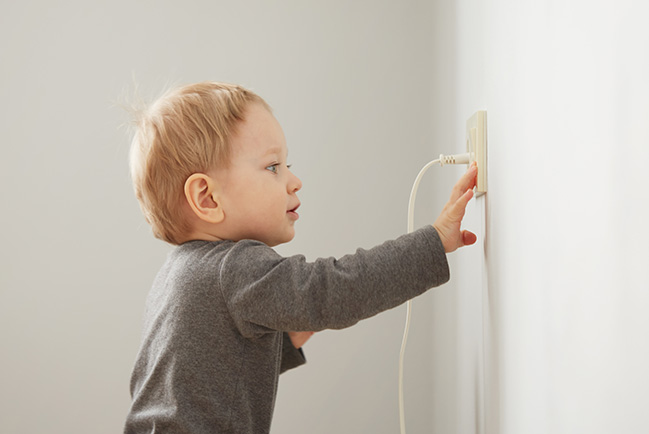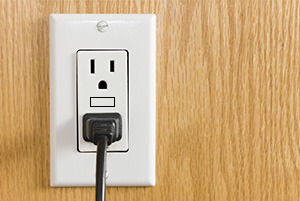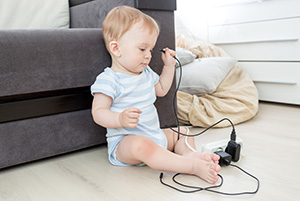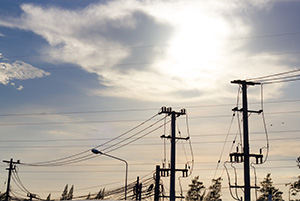
Every child starts out as an explorer, touching, tasting, and testing everything around them. Unfortunately, this curiosity leads to frequent emergency room visits. According to the U.S. Consumer Product Safety Commission, about 7 children per day (2,400 per year) are treated in emergency rooms for shocks and electrical burns related to electrical outlets — 89% are less than 6 years old.
Fortunately, many of these electrical accidents can be easily prevented. A little preparedness goes a long way in protecting your children, your home, and yourself from electrical systems. Since May is Electrical Safety Month, now is the perfect time to properly childproof your home from electrical hazards.
Electrical Safety Tips for Kids
Electrical Receptacle Safety

Electrical outlets are well within reach of babies and small children, but we can’t remove them because they’re needed for daily life. You can hire an electrician to move them higher, but this is expensive and often impractical.
Standard practice has been to use plastic outlet safety caps. A study by Temple University, however, shows that all 2–4 year olds can easily remove these plastic covers within 10 seconds. Kids can also easily unplug devices that are plugged in and access the outlet that way.
The typical victim inserts their finger or a small metal item like hairpins and keys into the outlet. The exposed metal of a plug can also cause severe electric burns if partially plugged in. While inserting plastic safety covers over all of your exposed outlets is definitely better than nothing, it’s far better to install tamper resistant receptacles (TRR).
Tamper Resistant Receptacles (TRR)
So what is a TRR? These are specially designed electrical receptacles that prevent anything other than electrical plugs from being inserted into the socket. While outlet covers can be removed, misplaced, or forgotten about after using an outlet, TRRs are always in place and passively protecting your child from your home’s electrical system.
TRR upgrades are fairly inexpensive (sometimes as little as 50 cents more than your standard outlet) and since 2008 have been the standard for electrical outlets installed in new homes. If your home was built or upgraded before 2008 and you have children under the age of 10, you should seriously consider upgrading to tamper resistant receptacles.
All of this is possible and completely childproof because of the shutter system used in TR receptacles. TRRs are easily identified from the letters “TR” between the two slots on the socket plate. But you can also tell if you have TRRs because the slots appear to be filled with plastic. The plastic shutters in a TRR are designed to prevent anything from being inserted into only one slot of the socket. This contraption prevents almost anything other than an electrical plug from being pushed into the TRR. There are no accessible small parts that can be removed, and there’s no way to forget to replace the shutter since it’s built into the receptacle.
For more information on tamper resistant receptacles, watch this video from Electrical Safety Foundation International (ESFI):
Power Strip and Surge Protector Safety

It’s important to remember that you have outlets in more than just the electrical receptacles in your walls and floors. Every power strip and extension cord is a potential hazard for small, exploring children.
It’s actually best to avoid using extension cords when you have small children (and really only best to use them if you absolutely need to do so). Extension cords are meant for temporary use only. If you are using an extension cord, make sure it is certified by an independent testing laboratory, such as Underwriters Laboratory (UL) or Intertek.
As previously mentioned, children over the age of two can easily remove plastic outlet covers from individual sockets. So instead of using outlet covers on your power strips and surge protectors, consider a tamper proof power-strip cover. These covers completely block the power strip and all plugged-in power cords from access.
Electrical Cord and Cable Safety
Children can chew and choke on electrical cords and cables. Never run cords or electrical equipment where people walk or could otherwise interfere. Don’t staple cords to walls and never run cords underneath rugs, furniture, or anything else.
There are multiple ways to hide cords and wires:
- Behind furniture
- Electrical tape
- Feeding the cord through a wall
- Cord clips
- Cord covers
- Flat wire covering
- Electrical conduits
And if you aren’t using the wire, get rid of it — blenders, computer monitors, DVD player, etc. Contact HELP for more information on hiding and organizing your cords and wires. Not only will everything look better and more organized, you’ll block your pet’s and child’s access to electric cords and wires. Child safety experts also recommend replacing corded blinds with cordless window treatments.
Never use any cables or wires with exposed wiring. The exposed wiring is a shock and fire hazard. Electric shock can cause painful injuries and even death. If you notice any of your cords are frayed or show exposed wiring, get them replaced immediately or have them repaired by a professional. One of the most common causes of home electrical fires are outdated electrical appliances and cords. A worn or frayed cord with exposed wiring could send heat to flammable sources, such as rugs, drapes, and floors.
Extension Cord Safety
Extension cords are temporary solutions. Make sure that you are using a UL-certified extension cord. If you are using one outdoors, always make sure that your extension cord is safe for outdoor use; they are heavier and less prone to damage. If you don’t have the necessary outlets for your home electrical needs, contact HELP for quick, professional outlet installations and new dedicated circuits!
Faulty Outlets, GFCI and AFCI Protection
Most home electrical fires are started by faulty outlets and appliances. As previously stated, never use appliances with exposed wiring. Similarly, make sure that your electrical outlets look and smell safe for use. A rotting egg smell can indicate a problem with your electrical wiring. Call a licensed electrician right away if you suspect a problem with your outlets, switches, or electrical system.
- If you have young ones at home, consider investing in tamper-resistant receptacles.
- Check your receptacles for any loose-fitting plugs and get them repaired immediately.
- Check in and around your home for properly working GFCI and AFCI protected outlets. GFCI outlets should be installed in any area where there might be water or moisture. Test your GFCI outlets monthly with the TEST and RESET buttons.
- Arc faults are the leading cause of electrical fires. Make sure your home is outfitted with AFCI outlets or breakers to protect against dangerous electrical arcing.
Backyard Electrical Safety
We’ve hit that golden barometer of summer — Memorial Day. Weather permitting, we’re already planning more outdoor activities including backyard barbecues, pool parties, and long evenings outdoors with friends. Extended time in the backyard also means that electrical equipment will be in use, especially with the ubiquity of smart phones, sound systems, and tablets. So it’s more important than ever to go over backyard electrical safety with the entire household.
Pool Safety

According the Consumer Product Safety Commission, there have been 60 electrocutions and nearly 50 electrical shocks involving electrical hazards in and around swimming pools since 1990. In some instances, the people attempting to help rescue the victims were harmed themselves. Wet skin and surfaces greatly increase the chances of electrocution when electricity is in the vicinity.
Here are some ways you can help prevent electrical accidents around swimming pools and spas:
Electrical Inspection – Every year it’s important to have your pool properly inspected by an electrician. This is especially important if there is a hot tub feature in (or connected to) the pool. All outdoor electrical outlets should be grounded and protected with ground fault circuit interrupters. If you notice any underwater lights that are flickering or not working properly, don’t enter the pool and contact an electrician right away.
Electrical Barrier – Make sure that all electrical wires, outlets, and junction boxes are at least five feet away from the pool and spa.
Label Power Switches – Clearly label all the power switches to corresponding outdoor equipment. This would include outdoor lighting, pool, hot tub, and spa equipment.
Electrical Devices – Don’t use electrical devices near the pool that are connected to cords. If you must use electronics, choose battery-operated ones.
Weather Warning – Make a rule that no one enters the pool during a thunderstorm. Lightning is a real threat and adding water to the equation can be deadly.
Emergency Plan – Create and practice an emergency plan for electrical hazards. If possible, create a sign or a laminated piece of paper that contains emergency numbers and a plan of action in case of electrocution.
General Safety – More foot traffic in the backyard means there are more opportunities for electrical mishaps. Be mindful of putting away electrical yard tools that have long cords attached. Now that smart phones, tablets, and personal computers have become so entrenched in daily life, we need to make sure they are handled safely outside. Try to encourage those who want to recharge their gadgets to do so indoors. Exposed cords can trip people and water from a nearby pool or a spilled drink can easily ruin electrical devices.
Outdoor Outlets – Make sure that your outdoor outlets have a weatherproof cover and are kept shut when not in use. You will also want to make sure that all exterior outlets are protected with ground fault circuit interrupters (GFCI), which will automatically shut off power if there is a short circuit.
Power Lines – Be mindful of power lines that hang low in your backyard. Summer weather promotes group activity including games and sporting events. Low hanging wires are real threat and should be avoided at all costs. And you never want power cords running above your pool or spa.
Yard Tools – Some yard tools are only used a few times a year. Check all of your electrical tools for cord damage or cracks in the casing before using them. This goes for all of your wires and cords. If you notice any damage, have them repaired or replaced.
Loose Cords – Electrical equipment that requires a cord plugged into an outlet should be used with the utmost care. If using a tool or small appliance, make sure that the cord is not placed in a path of heavy traffic. Also make sure to put away the equipment as soon as you’re finished with it. Never leave electrical equipment outside — whether it’s plugged into an outlet or battery operated. Additionally, don’t use any plugs that don’t fit snugly into the outlet.
Counterfeit Electrical Products – Make sure you only buy electrical products from reputable retailers. Check to make sure they have been tested by an independent testing laboratory, such as Underwriters Laboratory. Follow all manufacturer instructions before you use them.
Teach your children these electrical safety tips

- Do not fly kites or other flying toys around power lines or trees.
- Stay at least 30 feet away from any downed power lines. Call 911 and your local utility provider if you notice any downed power lines in your area.
- Teach your children not to stick anything other than approved electrical plugs inside of your outlets. For added protection, install baby proof covers and outlets in your home.
- Do not play around electrical fences, boxes, cords, or power lines.
- Seek shelter if you hear thunder or see lightning.
- Do not attempt to climb any electrical poles.
- Don’t use any electrical equipment if it has cracks, breaks, fraying, or other damage. Report damaged electrical equipment to an adult.
We also recommend showing your child these electrical safety videos. Contact us today for HELP baby-proofing your home from electrical dangers.
Use the Right Fire Extinguisher for Electrical Fires
Electrical fires are difficult to fight. As you can imagine, water and electrical fires don’t mix. So make sure your fire extinguisher is rated C. Never use water on class C, electrical fires. Learn more about the different fire extinguisher classes.
Signs of Electrical Hazards Around the Home
While you may not have experienced any major electrical problems in your home, there are several early warning signs that can signify a bigger problem. Before you call a licensed electrician to inspect your system, check for these signature signs:
- Frequently Flickering or Dimming Lights
- Two-Prong Outlets Throughout House (Not Grounded)
- No Ground Fault Circuit Interrupters (GFCIs) Installed (Near Water Features or Close to the Ground)
- Burning Odor of Plastic or Vinyl From Outlet
- Sparks From Outlet
- Recurring Tripped Circuit Breakers/Blown Fuses
- Outlet or Switch Doesn’t Work
- Switches/Outlets Warm to the Touch
- Slight Shock or Tingling Sensation When an Appliance is Touched
- Switches/Outlets Burned or Discolored
- Switches/Outlets Making Noises
- Frayed or Chewed Wiring
If you are experiencing one or more of these problems, you should schedule an electrical inspection immediately with a licensed technician. You will also want to make sure that smoke and carbon monoxide detectors are installed on every level of the home and outside every bedroom.
Schedule an Electrical Safety Inspection Every Year
Schedule a professional electrical safety inspection every year by a licensed electrician.
Remember that HELP Plumbing, Heating, Cooling and Drains offers electrical safety inspections and can help with all your interior and exterior residential electrical needs. Call us today at (513) 333-4357 or set up an appointment online!


